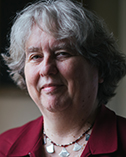
Janet B. Pierrehumbert
University of Oxford
|
Primary Section: 52, Psychological and Cognitive Sciences Secondary Section: 34, Computer and Information Sciences Membership Type:
Member
(elected 2019)
Photo Credit: Ian Wallman |
Biosketch
Janet Pierrehumbert is an experimental and computational linguist. She is known for her research on prosody and intonation, as well as her work on how people acquire and use lexical systems that combine general abstract knowledge of word forms with detailed phonetic knowledge about individual words. Pierrehumbert grew up in St Louis, Missouri and Princeton, New Jersey. She graduated from Harvard with a degree in Linguistics and a minor in Mathematics. She completed a Ph.D. in Linguistics from the Massachusetts Institute of Technology in 1980. Much of her dissertation work was done at AT&T Bell Labs, where she was also a Member of Technical Staff until 1989. She was on the Linguistics faculty of Northwestern University from 1989 though 2015, when she moved to the Oxford e-Research Centre at the University of Oxford, now part of the Department of Engineering Science. She is a founding member of the Association for Laboratory Phonology, and is also a Fellow of the Linguistic Society of America, the Cognitive Science Society, and the American Academy of Arts and Sciences.
Research Interests
Janet Pierrehumbert developed a model of the phonology and phonetics of English intonation that has been very influential in linguistics, psycholinguistics, and speech technology. She is currently working on the architecture and dynamics of lexical systems. She and her collaborators ask how individuals acquire vocabulary systems from linguistic experience, and how cognitive and social factors influence what people pay attention to, remember, and chose to produce. The research program involves large-scale analysis of corpora (ranging from speech recordings to on-line text, such as Wikipedia and Reddit); experiments on natural and artificial languages; and building and testing computational models. Results show that the use of statistical information is pervasive in the linguistic system, but also that people filter and regularize statistical information as they build abstract levels of representation. The group has demonstrated experimentally that social factors influence what examples of words people store in memory. Furthermore, social associations of words are readily learned, generalized to similar words, and available to introspection. In a longitudinal study of a regular sound change in New Zealand English, they found evidence for word-specific memories of fine phonetic detail as well as general effects of the phonology and of lexical competition. Using computational models, they have shown that a proper treatment of heterogeneity in the speech community is critical for understanding language change.

